叶子南《高级英汉翻译理论与实践》(第3版)-翻译练习(上)【圣才出品】
《高级英汉翻译理论与实践》翻译实践及详解(The Dover Beach)【圣才出品】
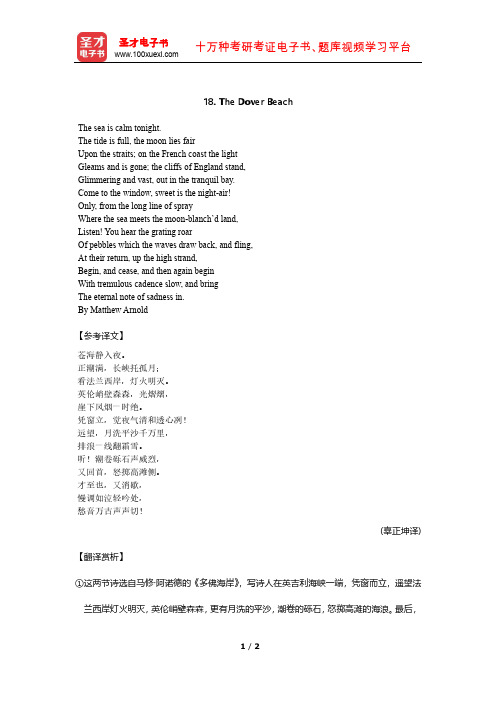
18. The Dover BeachThe sea is calm tonight.The tide is full, the moon lies fairUpon the straits; on the French coast the lightGleams and is gone; the cliffs of England stand,Glimmering and vast, out in the tranquil bay.Come to the window, sweet is the night-air!Only, from the long line of sprayWhere the sea meets the moon-blanch’d land,Listen! You hear the grating roarOf pebbles which the waves draw back, and fling,At their return, up the high strand,Begin, and cease, and then again beginWith tremulous cadence slow, and bringThe eternal note of sadness in.By Matthew Arnold【参考译文】苍海静入夜。
正潮满,长峡托孤月;看法兰西岸,灯火明灭。
英伦峭壁森森,光熠熠,崖下风烟一时绝。
凭窗立,觉夜气清和透心冽!远望,月洗平沙千万里,排浪一线翻霜雪。
听!潮卷砾石声威烈,又回首,怒掷高滩侧。
才至也,又消歇,慢调如泣轻吟处,愁音万古声声切!(辜正坤译) 【翻译赏析】①这两节诗选自马修·阿诺德的《多佛海岸》,写诗人在英吉利海峡一端,凭窗而立,遥望法兰西岸灯火明灭,英伦峭壁森森,更有月洗的平沙,潮卷的砾石,怒掷高滩的海浪。
最后,这壮观的景象引发了是人的遣怀与寄托,达到了情与景的结合,人与物的交融。
叶子南《高级英汉翻译理论与实践》(第3版)配套题库(含考研真题)(翻译的基本技巧 1.5 分合移位法
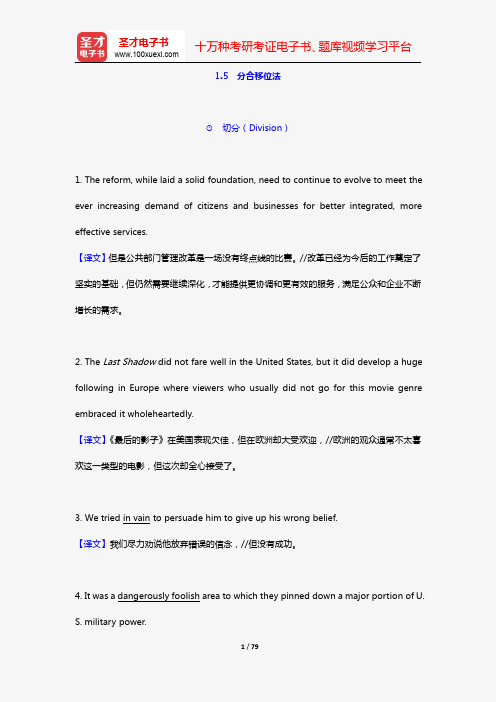
1.5分合移位法⊙切分(Division)1.The reform,while laid a solid foundation,need to continue to evolve to meet the ever increasing demand of citizens and businesses for better integrated,more effective services.【译文】但是公共部门管理改革是一场没有终点线的比赛。
//改革已经为今后的工作奠定了坚实的基础,但仍然需要继续深化,才能提供更协调和更有效的服务,满足公众和企业不断增长的需求。
2.The Last Shadow did not fare well in the United States,but it did develop a huge following in Europe where viewers who usually did not go for this movie genre embraced it wholeheartedly.【译文】《最后的影子》在美国表现欠佳,但在欧洲却大受欢迎,//欧洲的观众通常不太喜欢这一类型的电影,但这次却全心接受了。
3.We tried in vain to persuade him to give up his wrong belief.【译文】我们尽力劝说他放弃错误的信念,//但没有成功。
4.It was a dangerously foolish area to which they pinned down a major portion of U. itary power.【译文】他们把美国一大部分军事力量困在那个地区,//这(样做)是愚蠢而危险的。
5.Hitler’s black empire would suddenly collapse in rubble,blood,and flame. (Winds of War)【译文】希特勒的黑暗帝国顷刻之间就会在血泊与烈火中崩溃,//夷为废墟。
《高级英汉翻译理论与实践》翻译实践及详解(Mayhew)【圣才出品】
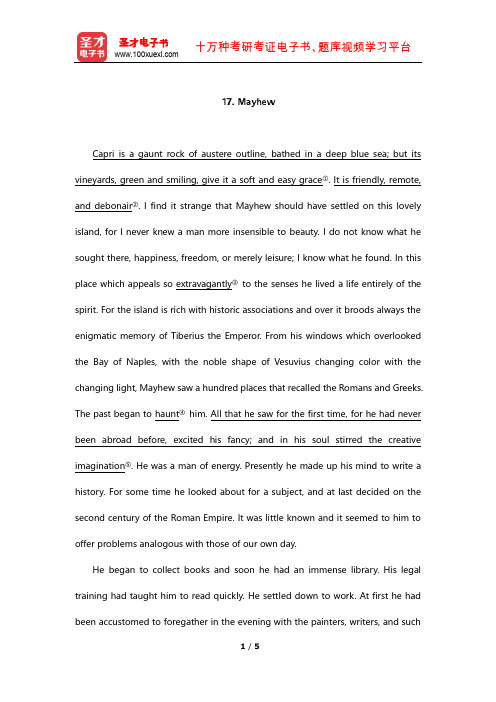
17. MayhewCapri is a gaunt rock of austere outline, bathed in a deep blue sea; but its vineyards, green and smiling, give it a soft and easy grace①. It is friendly, remote, and debonair②. I find it strange that Mayhew should have settled on this lovely island, for I never knew a man more insensible to beauty. I do not know what he sought there, happiness, freedom, or merely leisure; I know what he found. In this place which appeals so extravagantly③to the senses he lived a life entirely of the spirit. For the island is rich with historic associations and over it broods always the enigmatic memory of Tiberius the Emperor. From his windows which overlooked the Bay of Naples, with the noble shape of Vesuvius changing color with the changing light, Mayhew saw a hundred places that recalled the Romans and Greeks. The past began to haunt④him. All that he saw for the first time, for he had never been abroad before, excited his fancy; and in his soul stirred the creative imagination⑤. He was a man of energy. Presently he made up his mind to write a history. For some time he looked about for a subject, and at last decided on the second century of the Roman Empire. It was little known and it seemed to him to offer problems analogous with those of our own day.He began to collect books and soon he had an immense library. His legal training had taught him to read quickly. He settled down to work. At first he had been accustomed to foregather in the evening with the painters, writers, and suchlike who met in the little tavern near the Piazza, but presently he withdrew himself, for his absorption in his studies became more pressing. He had been accustomed to bathe in that bland sea and to take long walks among the pleasant vineyards, but little by little, grudging the time, he ceased to do so⑥. He worked harder than he had ever worked in Detroit. He would start at noon and work all through the night till the whistle of the steamer that goes every morning from Capri to Naples told him that it was five o’clock and time to go to bed. His subject opened out before him, vaster and more significant⑦, and he imagined a work that would put him forever beside the great historians of the past. As the years went by he was to be found seldom in the ways of men. He could be tempted to come out of his house only by a game of chess or the chance of an argument. He loved to set his brain against another’s⑧. He was widely read now, not only on history, but in philosophy and science; and he was a skillful controversialist, quick, logical, and incisive⑨. But he had good-humor⑩and kindliness; though he took a very human pleasure in victory⑪, he did not exult in it to your mortification.By William S. Maugham 【参考译文】卡普里岛在深蓝色的大海中,远远望去仿佛是一块朴实无华的荒凉的岩石。
叶子南《高级英汉翻译理论与实践》(第3版)配套题库(含考研真题)(翻译的基本技巧 1.6 定语从句)

1.6定语从句Ⅰ.译为定语1.There will come a day when people the world over will live a happy life under the sun of socialism.【译文】全世界人民在社会主义阳光下过幸福生活的一天是会到来的。
2.Those who did not die from smallpox usually carried scars on their faces for life.【译文】那些没有死于天花的人通常脸上会终生留下疤痕。
3.This is the very hotel where they spent their honeymoon.【译文】这正是他们曾经度蜜月的那家旅馆。
4.The technique of organ transplant,as a significant surgical breakthrough to heal the wounded and rescue the dying,has saved a good many patients who are on the point of death.【译文】器官移植手术是外科方面的重大技术突破,目的是救死扶伤,已经挽救了许多濒临死亡的病人的生命。
5.Mr.Murdoch who owns the New York Post indicated that U.S.newspaper’s editorial strategies were to blame for their financial problems.【译文】拥有《纽约邮报》的默多克先生指出,美国报纸的编辑战略应承担报纸财务问题的责任。
【解析】这里的定语从句的翻译是典型的前置法。
翻译时按照汉语的习惯加个“的”字。
6.The people who worked for him lived in mortal fear of him.【译文】在他手下工作的人对他怕得要死。
《高级英汉翻译理论与实践》翻译实践及详解( Congestive Heart Disease)【圣才
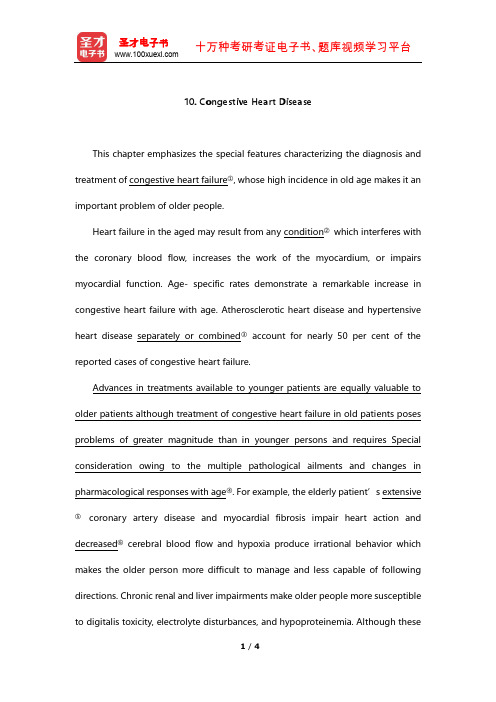
10. Congestive Heart DiseaseThis chapter emphasizes the special features characterizing the diagnosis and treatment of congestive heart failure①, whose high incidence in old age makes it an important problem of older people.Heart failure in the aged may result from any condition②which interferes with the coronary blood flow, increases the work of the myocardium, or impairs myocardial function. Age- specific rates demonstrate a remarkable increase in congestive heart failure with age. Atherosclerotic heart disease and hypertensive heart disease separately or combined③account for nearly 50 per cent of the reported cases of congestive heart failure.Advances in treatments available to younger patients are equally valuable to older patients although treatment of congestive heart failure in old patients poses problems of greater magnitude than in younger persons and requires Special consideration owing to the multiple pathological ailments and changes in pharmacological responses with age④. For example, the elderly patient’s extensive ⑤coronary artery disease and myocardial fibrosis impair heart action and decreased⑥cerebral blood flow and hypoxia produce irrational behavior which makes the older person more difficult to manage and less capable of following directions. Chronic renal and liver impairments make older people more susceptible to digitalis toxicity, electrolyte disturbances, and hypoproteinemia. Although thesechanges tend to thwart therapeutic efforts and render management more difficult, attention⑦to the diagnostic and therapeutic suggestions in this chapter should rectify and prevent recurrent congestive heart failure and provide more successful care in the hospital and at home.The pathology of heart failure in the aged includes all form of heart diseases in younger people and, in addition, the special entities found mainly in the elderly. The multiplicity of pathologic conditions increases with age and complicates the assessment of the pathologic basis for the heart failure⑧. Heart failure in aged patients often has more than one cause and may be associated with numerous other disorders⑨.From The Management of Geriatric CardiovascularDiseases by Raymond Harris 【参考译文】本章着重讨论在充血性心力衰竭的诊断与治疗中存在的特殊问题。
翻译理论与实践(汉译英)习题及参考答案

翻译理论与实践(汉译英)习题第一周词的选择复习思考题:翻译下列句子,注意选词:我的表不准,每天快十多分钟。
时间过得真快!情人节快到了。
这把刀很快。
参考译文:My watch doesn’t keep good time. It gains more than ten minutes a day.How time does fly!Valentine’s Day is near. Or:Valentine’s Day is at hand. Or:Valentine’s Day is drawing near.The knife is really sharp. (*The knife is swift.)第二周词语翻译技巧(词义引申)复习思考题练习:根据本节所讲进行选词1.人民现在为什么拥护我们?就是这十几年有发展。
2.由于全球气候变暖,海平面在一点点地上升。
3.改革开放也使民族精神获得了解放。
4.我们的企业应着重提高国际竞争力。
5.中国的现代化建设离不开与世界各国的经济合作与贸易往来。
6.世界科技进步和产业结构的调整,亚太地区经济的迅速增长,给我国经济发展提供了有利条件。
在我国中长期发展中,也有不可制约的因素,突出的是:……7.在1993年亚太经合组织第一次领导人非正式会议上,我曾说过,把一个什么样的世界带到二十一世纪,是我们这一代领导人必须认真思考和解决的重大问题。
环顾新世纪初的世界和亚太地区形势,可以说是有喜有忧。
8.为了进行认真细致的考察,他很少乘车坐船,几乎全靠双脚翻山越岭,长途跋涉;为了弄清大自然的真相,他总是挑选道路艰险的山区,人迹稀少的森林进行考察,发现了许多奇山秀景。
9.专家普遍认为积极的财政政策对于最近几年的经济快速增长势头起了很大作用,2003年,这一政策的实施除了应向社会保障,农村教育及基础设施倾斜以外,还应从政府投资转向民间投资。
10.这些价值观和孔子宣扬的一些思想有很多相同之处,孔子的思想强调的是中庸适度。
《高级英汉翻译理论与实践》翻译实践及详解(Has Democracy a Future)【圣才出品】
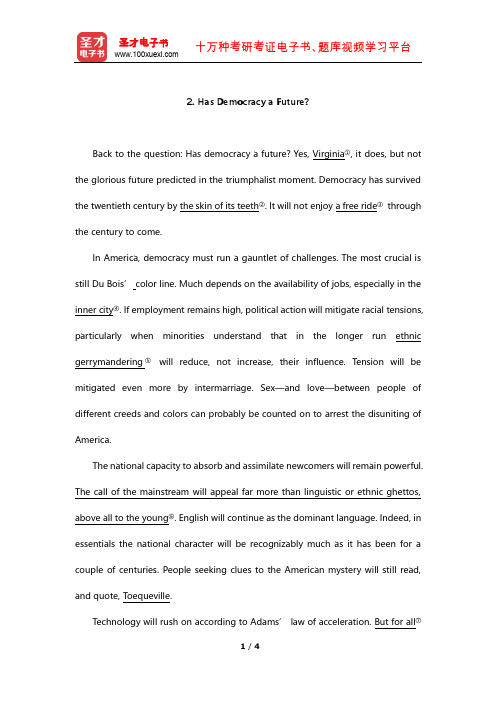
2. Has Democracy a Future?Back to the question: Has democracy a future? Yes, Virginia①, it does, but not the glorious future predicted in the triumphalist moment. Democracy has survived the twentieth century by the skin of its teeth②. It will not enjoy a free ride③through the century to come.In America, democracy must run a gauntlet of challenges. The most crucial is still Du Bois’ color line. Much depends on the availability of jobs, especially in the inner city④. If employment remains high, political action will mitigate racial tensions, particularly when minorities understand that in the longer run ethnic gerrymandering⑤will reduce, not increase, their influence. Tension will be mitigated even more by intermarriage. Sex—and love—between people of different creeds and colors can probably be counted on to arrest the disuniting of America.The national capacity to absorb and assimilate newcomers will remain powerful. The call of the mainstream will appeal far more than linguistic or ethnic ghettos, above all to the young⑥. English will continue as the dominant language. Indeed, in essentials the national character will be recognizably much as it has been for a couple of centuries. People seeking clues to the American mystery will still read, and quote, Toequeville.Technology will rush on according to Adams’ law of acceleration. But for all⑦the temptations of interactivity⑧and all the unpopularity of elected officials, I doubt that Americans will sanction the degradation⑨of representative democracy into a system of plebiscites. Capitalism too will careen on, through downs as well as ups, but laissez-faire ideology will probably wane as capitalists discover the range of troubles the unfettered market cannot solve, or makes worse. Unbridled capitalism, with low wages, long hours, and exploited workers, excites social resentment, revives class warfare, and infuses Marxism with new life. To move along constructive lines, capitalism must subordinate short-term plans and profits to such long-term social necessities⑩as investment in education, research and development, environmental protection, the extension of health care, the rehabilitation of infrastructure, the redemption of the city. Capitalists are not likely to do this by themselves. Long- term perspectives demand public leadership⑪ and affirmative government.From Foreign Affairs, September/October 1997 【参考译文】回到我们原来的问题:民主有前途吗?有!①民主是有前途,但并不像人们在必胜信念、乐观心态盛行时期所预测的那种光辉灿烂的前途。
叶子南《高级英汉翻译理论与实践》(第3版)配套题库(含考研真题)(翻译的基本技巧 1.2 词性转换法

1.2词性转换法⊙名词转换1.a good sailor【译文】不晕船2.a slow walker【译文】走得慢3.a heavy smoker【译文】烟抽得很多/烟鬼4.a big eater【译文】吃得很多/能吃/饭量大5.a great believer in...【译文】笃信……6.the greatest sufferer【译文】受苦(害)最深7.the best singer【译文】唱得最好/最好的歌唱家8.a good swimmer【译文】很会游泳9.a good loser【译文】输得起10.the worst dancer【译文】最不会跳舞11.an early riser【译文】早起(床)的人12.a hard worker【译文】勤奋工作13.a fast runner【译文】跑得很快14.a slick talker【译文】能说会道/耍嘴皮子/耍花腔15.a willing worker【译文】乐意干活16.a duelist【译文】好决斗17.a good observer【译文】善于观察18.a great joker【译文】很会开玩笑19.a light sleeper【译文】睡眠时易醒/睡不熟/易警醒20.a good thief【译文】很会偷/善偷21.a bad liar【译文】不会说谎/很不善于撒谎22.a rapid writer【译文】笔头快/下笔快/写得快23.a good whistler【译文】口哨吹得好24.a bit of a fancier【译文】有点喜欢胡思乱想25.a good looker【译文】很好看/很漂亮/美人26.a master complicator【译文】真会捣乱27.a loner【译文】喜欢孤独的人/独立自主的人/不合群28.a clock-watcher【译文】老是看钟等下班(或下课等)的工人(或学生等)29.the best hater【译文】最会记仇30.a worrier【译文】放心不下/担心/发愁31.an idler or a loafer【译文】游手好闲/懒汉/闲荡32.a good worker【译文】干得好33.The speakers called for the downfall of imperialism,abolition of exploitation of man by man,liberation of the oppressed of China and the world.(G.Hatem:A Tribute)【译文】讲演者号召人们打倒帝国主义,消灭人剥削人的制度,解放中国和世界受压迫者。
- 1、下载文档前请自行甄别文档内容的完整性,平台不提供额外的编辑、内容补充、找答案等附加服务。
- 2、"仅部分预览"的文档,不可在线预览部分如存在完整性等问题,可反馈申请退款(可完整预览的文档不适用该条件!)。
- 3、如文档侵犯您的权益,请联系客服反馈,我们会尽快为您处理(人工客服工作时间:9:00-18:30)。
第二部分翻译实践篇详解一、非文学类文本(社会人文)1. Van GoghAlthough art historians have spent decades demystifying Van Gogh’s legend ①, they have done little to diminish his vast popularity. Auction prices still soar, visitors still overpopulate Van Gogh exhibitions, and The Starry Night remains ubiquitous on dormitory and kitchen walls②. So complete is Van Gogh’s global apotheosis that③Japanese tourists now make pilgrimages to Auvers to sprinkle their relatives’ ashes on his grave. What accounts for the endless appeal of the Van Gogh myth? It has at least two deep and powerful sources④. At the most primitive level, it provides a satisfying and nearly universal revenge fantasy disguised as the story of heroic sacrifice to art⑤. Anyone who has ever felt isolated and unappreciated can identify with Van Gogh and hope not only for a spectacular redemption⑥but also to put critics and doubting relatives to shame. At the same time, the myth offers an alluringly simplistic conception of great art as the product, not of particular historical circumstances and the artist’s painstaking calculations, but of the naive and spontaneous outpourings of a mad, holy fool⑦. The gaping discrepancy between Van Gogh’s long-suffering life and his remarkable posthumous fame remains a great and undeniable historical irony. But the notion that he was an artistic idiot savant⑧is quickly dispelled by even the most glancing examination of the artist’s letters. It also must be dropped after acquaintingoneself with the rudimentary facts of Van Gogh’s family background, upbringing, and early adulthood.The image of Van Gogh as a disturbed and forsaken artist is so strong that one easily reads it back into⑨his childhood and adolescence. But if Van Gogh had died at age twenty, no one would have connected him with failure or mental illness. Instead he would have been remembered⑩by those close to him as a competent and dutiful son with a promising career in the family art-dealing business. He was, in fact, poised to surpass his father and to come closer to living up to the much-esteemed Van Gogh name⑪.The Van Goghs were an old and distinguished Dutch family who could trace their lineage in Holland back to the sixteenth century. Among Vincent’s five uncles, one reached the highest rank of vice-admiral in the Navy and three others prospered as successful art dealers. Van Gogh’s grandfather, also named Vincent, had attained an equally illustrious status as an intellectually accomplished Protestant minister. The comparatively modest achievements of the artist’s father, Theodorus, proved the exception, not the rule⑫. Although Theodorus was the only one of grandfather Vincent’s six sons to follow him into the ministry, he faltered as a preacher⑬ and could obtain only modest positions in provincial churches. It was for this reason that Theodorus and his new wife, Anna, found themselves in Groot Zundert, a small town near the Belgian border. Vincent was born a few years after their arrival.Van Gogh enjoyed a relatively uneventful childhood save for the birth of fivesiblings (three by the time he was six and two more by his fourteenth year)⑭ and his attendance at two different boarding schools. In rural Zundert he took long walks in the Brabant countryside and developed a naturalist’s love of animals and plants. At his two boarding schools, he excelled at his studies and laid down the foundation for his lifelong facility in French and English. The family’s decision to apprentice him at sixteen to Uncle Vincent’s art gallery in The Hague was far from a nepotistic last resort. Uncle Vincent, called “Cent,” had transforme d an art supply store into a prestigious art gallery and had become a senior partner in Goupil et Cie., one of the largest art-dealing firms in Europe. Vincent had not better opportunity for advancement than working at The Hague branch of Goupil’s. And it was a testament to Vincent’s abilities that the childless “Uncle Cent” took a paternal interest in him and arranged for his position as Goupil’s youngest employee⑮.Vincent’s duties progressed from record keeping and correspondence chores in the back office to dealing, if only in a subordinate way⑯, with clients. This confronts us with the nearly unthinkable image of the “socially competent” Vincent⑰. But such was the case at this stage in his life. The same man whose eccentricity would one day make young girls scream in fright dressed appropriately and charmed customers with his enthusiasm for art⑱. Vincent also ingratiated himself with the local artists of The Hague School and earned his colleagues’respect. Although his status as Uncle Cent’s nephew and protege must have smoothed his way, Vincent appears to have been genuinely dedicated and effectiveat Goupil’s. His boss, Tersteeg, sent home glowing reports⑲ and after four years at The Hague he was promoted to the London branch.From Van Gogh and Gauguin, by Bradley Collins 【参考译文】梵高尽管艺术史家们数十年来一直在淡化梵高传奇的神秘色彩①,但梵高受欢迎的程度几乎丝毫未减。
